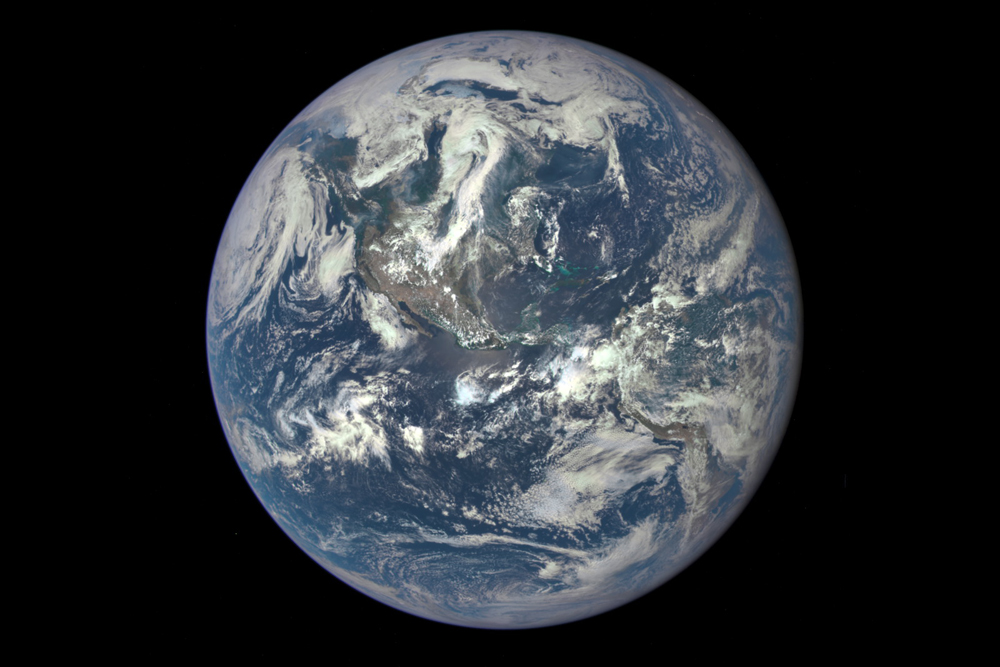
Earth science is more important than ever (op-ed)
Everything on our planet is connected.

Dr. Thomas Zurbuchen is associate administrator for NASA's Science Mission Directorate. He contributed this article to Space.com's Expert Voices: Op-Ed & Insights.
In a time of global crisis, people are keenly aware of how interconnected we all are on planet Earth, even as many of us work in isolation or are disconnected from the way our lives were previously. Our satellites in space gathering data and images of our home planet unite us in ways that are more important now than ever.
From space, we see Earth as one comprehensive system with complex interactions among land, ocean, ice and atmosphere. It is a living planet without borders. Even with all the scientific and technological advances we have made in the roughly 60 years after the first Earth-observation satellites were launched, we are only just beginning to understand fully the way our planet works. But we know we depend on its limited resources.
Related: Earth Day 2020! Celebrate our planet with these online activities
More: How Apollo 8's 'Earthrise' photo helped spark the first Earth Day
At NASA, we have 20 Earth-observation missions on orbit, including instruments aboard the International Space Station. NASA's data are made freely available to anyone in the world. Their value grows every year as an environmental baseline that informs us about how our planet is changing and responding to natural and human influence. We can observe short-term changes such as weather, and long-term changes such as sea level rise, and how problems such as the ozone hole have begun to recover. International partnerships are a big part of this work, including our next mission to launch, Sentinel 6 Michael Freilich, a European-led mission with NASA participation that this November will launch to help us learn more about how global sea level is changing.
NASA's investment in space — both the unique Earth science we conduct from orbit and the technology we've developed by living in space and exploring our solar system and universe — is returning benefits every day to Americans and to people around the world. Those whose lives are affected by hurricanes benefit from having accurate global information about air, water and land, for instance. From documenting Earth's changing environment on all timescales to creating green technologies to conserve energy and natural resources, NASA helps us all live more sustainably and adapt to natural and human-caused changes. Using these data, farmers can more efficiently irrigate. First responders can prevent the spread of wildfires. And decisionmakers worldwide have at their fingertips a wealth of data, born of research, engineering and technology that would have been unheard of 50 years ago when we celebrated the first Earth Day. Indeed, one can argue that the knowledge of our Earth generated from satellites represents one of the greatest scientific achievements of our time.
Related: Earth quiz: Do you really know our planet?
Get the Space.com Newsletter
Breaking space news, the latest updates on rocket launches, skywatching events and more!
But we need to do more. The knowledge gained from our international fleet of Earth-observing satellites leads to the need for more information. As we watch polar ice sheets shrink or encounter stronger storms, our assets in space, and the data they produce, will become ever more critical to protect lives, property and resources. And that knowledge generates more questions.
The international scientific community needs to continue to do this vital work on behalf of every person worldwide. There is, for instance, global consensus about the increase of carbon dioxide and greenhouse gases in our atmosphere, the role humans play in these increases and their broad environmental impacts. Yet only in 2017 could the first global, space-based analysis focused on both natural and human-made sources and sinks of carbon dioxide occur, a result of the Orbiting Carbon Observatory 2 (OCO2) mission we launched in 2014. We are committed to continue studying and gathering data about the Earth's carbon cycle and relating that information to the bigger picture. In fact, we launched OCO-3 to the International Space Station in 2019, and are working on GeoCarb with a launch in 2022, hosted on a commercial spacecraft and mapping these emissions over the Western Hemisphere with better spatial and temporal resolution.
Science contributes to the solutions we need to the challenges we all face. It informs our options and provides a foundation for continuing information gathering and dialogue, globally. At NASA and our partners internationally, we have a responsibility to do great things and inspire the next generation. Because this work will not end, and future generations must have a legacy for exploring, understanding and protecting our home planet. An image from space that shows the power of hurricanes, fires, floods and volcanic eruptions, or the absence of light in a populated area during the COVID-19 crisis, truly humbles a person with the power and majesty of our planet.
So, yes, we will celebrate Earth Day this year, albeit perhaps differently than in the past, but taking full advantage of the unique perspective that space provides. All of us will continue to share the same air and the same destiny as humans aboard this spaceship we call Earth. And we'll celebrate our curiosity, our connections to each other and our aspirations for a better world. And our perseverance together on our wonderful home planet.
- Earth Day 2019: These amazing NASA images show Earth from above
- NASA's best Earth-from-space photos by astronauts in 2017 (gallery)
- How was Earth formed?
Follow all of the Expert Voices issues and debates — and become part of the discussion — on Facebook and Twitter. The views expressed are those of the author and do not necessarily reflect the views of the publisher.
OFFER: Save 45% on 'All About Space' 'How it Works' and 'All About History'!
For a limited time, you can take out a digital subscription to any of our best-selling science magazines for just $2.38 per month, or 45% off the standard price for the first three months.
Join our Space Forums to keep talking space on the latest missions, night sky and more! And if you have a news tip, correction or comment, let us know at: community@space.com.

Associate Administrator for the Science Mission Directorate at NASA from 2016 to 2022. Previously Professor of Space Science and Aerospace Engineering at the University of Michigan. Also founder of the largest Entrepreneurship programme at American Universities - the Michigan Center for Entrepreneurship - and a member of the International Academy of Astronautics.
-
Catastrophe ReplyAdmin said:Our satellites in space gathering data and images of our home planet unite us in ways that are more important now than ever.
Earth science is more important than ever (op-ed) : Read more
I suppose the only answer to encircling our planet with errr . . . . . . . . .
those nice pieces of metal and stuff . . . . . . . . . is to move our telescopes off world o_O










